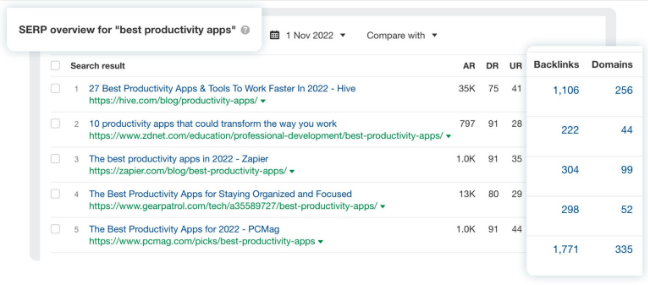SEO stands for Search Engine Optimization, and it is the process of optimizing websites and webpages in order to make them more visible in search engine results.
SEO is important for businesses and websites because it helps them to increase their visibility and reach more potential customers. By optimizing their websites and webpages, businesses can ensure that they are showing up in the top results when customers are searching for related terms. This helps to increase traffic to their websites and generate more leads and sales. Additionally, SEO can also help to improve the overall user experience on a website, as well as improving its overall ranking. By improving the quality of content and making sure that it is properly optimized, businesses can ensure that their websites are ranked higher in search engine results and can attract more customers.
This article will provide a step-by-step guide on how to get started with SEO. We will cover the basics of SEO and how to implement it into your website. We’ll also look at the most important SEO elements to focus on and how to measure your progress. Finally, we’ll provide some tools and resources to help you succeed in your SEO journey.
Step 1: Conduct keyword research
Keyword research is the process of discovering and analyzing the words and phrases used by potential customers when searching for products, services, or content related to a particular topic. It is important for SEO because it helps identify the words and phrases that people are using to search for information related to a particular topic. By understanding what people are searching for, businesses can create content that is more likely to be found by their target audience. Additionally, it can also help identify new opportunities to reach potential customers.
Here is a help card;
- Utilize keyword research tools – Services such as Google Adwords, SEMrush, and Moz Keyword Explorer can be used to discover popular and relevant keywords for your business.
- Analyze the competition – Take a look at your competitors’ sites to see what keywords they are targeting.
- Start with broad keywords – Start your search by using broad terms related to your business.
- Get specific – Once you’ve identified some initial keywords, start digging deeper and get more specific.
- Consider search intent – Think about how your target audience is searching for your product or service and adjust your keywords accordingly.
- Check search volume – Take a look at search volume data to determine how many people are searching for a particular keyword.
- Utilize long-tail keywords – Long-tail keywords are more specific phrases that are often less competitive and can generate more targeted traffic.
- Monitor Your Results – Monitor your keyword performance regularly, and adjust your strategy as needed.
Step 2: Optimize website content

- Researching keywords: Before you start writing, it’s important to identify the keywords and phrases that people are using to search for the topics you want to write about. You can use tools like Google’s Keyword Planner to identify the most popular keywords in your industry and use these throughout your content to help it rank higher in search results.
- Creating high-quality and relevant content: Once you’ve identified the keywords you want to use, the next step is to create content that is both high-quality and relevant to your audience. This means writing in a clear and engaging way that provides value to your readers. It also means ensuring that your content is accurate and up-to-date, and that it provides information that people are looking for.
- Using header tags and subheadings: When you’re writing content for your website, it’s important to use header tags and subheadings to organize your content and make it easy for readers to scan and understand. This can also help search engines understand the structure and content of your page, which can improve your ranking.
- Optimizing images and videos: In addition to text, your website may also include images and videos. These can be great for engaging readers and providing additional information, but it’s important to optimize them for SEO as well. This means using descriptive file names and alt tags for images, and providing transcripts or captions for videos.
- Internal linking: Another important aspect of SEO is internal linking, which is the practice of linking to other pages on your website within your content. This can help search engines understand the structure of your site and improve the way your pages rank. It can also help readers navigate your website and find related content that they might be interested in.
Overall, optimizing website content for SEO involves conducting keyword research, creating high-quality and relevant content, using header tags and subheadings, optimizing images and videos, and using internal linking. By following these steps, you can improve the ranking of your website on search engines and make it more likely that people will find and engage with your content.
Step 3: Improve website structure and technical SEO
Having a well-structured website is important for SEO because it helps search engines understand the content and organization of your site. This can improve the way your pages rank in search results and make it easier for people to find your website.
To improve the structure of your website, there are a few key steps you can take. These include:
- Using a clear and organized navigation: Having a clear and intuitive navigation menu is important because it helps visitors to find the content they are looking for on your site. This can be as simple as having a main menu at the top of your site that links to your most important pages, as well as a footer menu that links to additional pages and resources.
- Using header tags: Header tags are a way of organizing the content on your page into sections and sub-sections. This can make your content easier to read and understand, and it can also help search engines understand the structure of your page. To use header tags, simply add H1 tags to your main headings, H2 tags to subheadings, and so on.
- Optimizing URLs: The URL, or web address, of each page on your website is an important factor for SEO. To optimize your URLs, make sure they are short, descriptive, and easy to read. Avoid using long strings of numbers and letters, and try to include the main keywords for the page in the URL.
Overall, having a well-structured website is important for SEO because it helps search engines understand the content and organization of your site. By using a clear and organized navigation, using header tags, and optimizing URLs, you can improve the structure of your website and make it more likely that your pages will rank well in search results.
In addition to the structure of your website, there are several other technical SEO factors that you should consider to improve the ranking of your site in search results. These include:
- Site speed: The speed at which your website loads is an important factor for SEO because it can affect the user experience and the way search engines rank your site. To improve your site speed, you can optimize images and other media, minify your code, and use a content delivery network (CDN) to distribute your content more efficiently.
- Mobile-friendliness: More and more people are using mobile devices to access the internet, so it’s important that your website is optimized for mobile. This means ensuring that your content is easy to read and navigate on smaller screens, and that your site loads quickly on mobile devices.
- Security: In addition to the user experience, the security of your website is also an important factor for SEO. Search engines want to provide their users with safe and secure search results, so sites that have been hacked or are vulnerable to attacks may be penalized in the rankings. To improve the security of your site, you can use HTTPS encryption, implement regular backups, and keep your software and plugins up to date.
Overall, there are several technical SEO factors that you should consider to improve the ranking of your site in search results. By optimizing your site speed, making your site mobile-friendly, and improving its security, you can help to improve your search engine rankings and make it more likely that people will find and engage with your content.
Step 4: Build backlinks

Backlinks are links from other websites to your website. They are important for SEO because they help to improve the credibility and authority of your site in the eyes of search engines. When other websites link to your site, it signals to search engines that your site is providing valuable and useful information, and this can help to improve your ranking in search results.
To build high-quality backlinks, there are a few key steps you can take. These include:
- Creating valuable content: One of the best ways to earn backlinks is to create content that is valuable and useful to your audience. This could be a blog post, an article, a video, or any other type of content that provides value to your readers. When you create content that is worth sharing, other websites are more likely to link to it, which can help to improve your search engine rankings.
- Guest posting: Another way to earn backlinks is to guest post on other websites in your industry. When you write a guest post, you can include a link back to your own website in the author bio or in the body of the post. This can help to drive traffic to your site and improve your search engine rankings.
- Earning links through partnerships: Another effective way to build backlinks is to earn them through partnerships with other websites. For example, you could partner with a complementary business or organization and share each other’s content on your websites. This can help to increase the visibility of your site and earn valuable backlinks.
Overall, backlinks are important for SEO because they help to improve the credibility and authority of your site in the eyes of search engines. By creating valuable content, guest posting, and earning links through partnerships, you can build high-quality backlinks that can help to improve your search engine rankings.
In conclusion, SEO can be a valuable tool for businesses and websites that want to improve their online visibility and reach more potential customers. While it requires time and effort, the benefits can be significant and well worth the investment.



